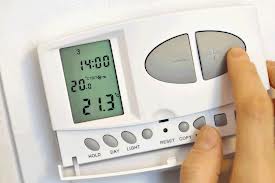
There are 2x modes which allow a temperature set point to be made, cooling mode and heating mode.
The answer to this question is that there is no answer – everyone is different and will therefore like a different temperature, from our experience the general norm setting in cooling & heating mode is around 22C.
Setting Air Conditioning Temperature
Setting your Air Conditioner lower than 21C in cooling mode is normally regarded as too cold and is generally a waste of electric in trying to cool the room this cold, likewise trying to heat a room to higher than 24C is generally a waste of electric – most people set their home thermostat to approx 22C so you should set your Air Conditioner to the same temperature.
You shouldn’t set the Air Conditioner to the lowest cooling setting (generally 18C) – this is far too cold for an office environment and likewise you shouldn’t set the temperature to 30C in heating mode, both of these simply waste electric.
Keep Cool in the Office
Temperature set points can cause arguments within an office environment; we have found that men generally like the temperature lower compared to women, we have one customer whom has a mixed office and on a service visit we found that the women had all moved to one end of the office whilst the men had all moved to the other end of the office, the office had 2x air conditioner units and they found this way the men & women each had their own system – a tad extreme but nonetheless solved the office bickering.
In summary we would recommend a temperature set point of approx 22C.
